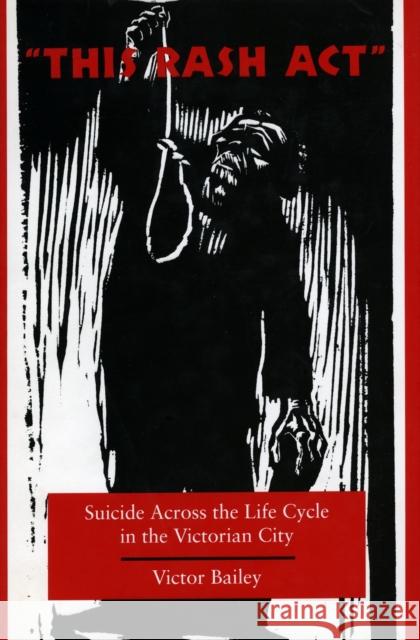'This Rash Act': Suicide Across the Life Cycle in the Victorian City » książka
'This Rash Act': Suicide Across the Life Cycle in the Victorian City
ISBN-13: 9780804731249 / Angielski / Miękka / 2000 / 372 str.
'This Rash Act': Suicide Across the Life Cycle in the Victorian City
ISBN-13: 9780804731249 / Angielski / Miękka / 2000 / 372 str.
(netto: 116,57 VAT: 5%)
Najniższa cena z 30 dni: 120,90
ok. 22 dni roboczych.
Darmowa dostawa!
What made some 700 men and women in the Yorkshire town of Kingston-upon-Hull, in the years 1837 to 1900, decide to suffer no longer "the slings and arrows of outrageous fortune" and take their own lives? In this study, the author seeks to uncover the experiences that drove people to suicide; to analyze how suicide was understood by victims, by their families and friends, and by legal and medical authorities; to study how the presumed causes of suicide and the meanings of suicide changed over time and in response to changed social circumstances; and to see what "suicide narratives" elicited by coroners' inquests can tell us about Victorian life, beliefs, and values in general. The book is based on an unprecedentedly complete and comprehensive collection of inquest files covering the entire Victorian era in Hull (most coroners' files have not survived or exist only in fragmentary form). Hitherto, suicide in the Victorian period has been examined only on a national basis; where local evidence has been used, it has come chiefly from London. Through the testimony of relatives, neighbors, friends, and even the deceased (by means of suicide notes), the author has been able to get closer to the experience of suicide and its social construction than has been possible in any previous study. The framework within which the author evaluates the paths to suicide is the life cycle. By placing each suicide in its local socioeconomic context, and by examining each stage in the life course for each sex and for different social levels, the author has been able to assess causation factors with great confidence. He establishes arguments (such as the importance of declining wages and job security for older men and the loss of a marital partner for either sex) more securely than have earlier studies, and puts some new arguments on the agenda (such as the importance of the presence or absence of interpersonal ties and the influence of Poor Law policy).











